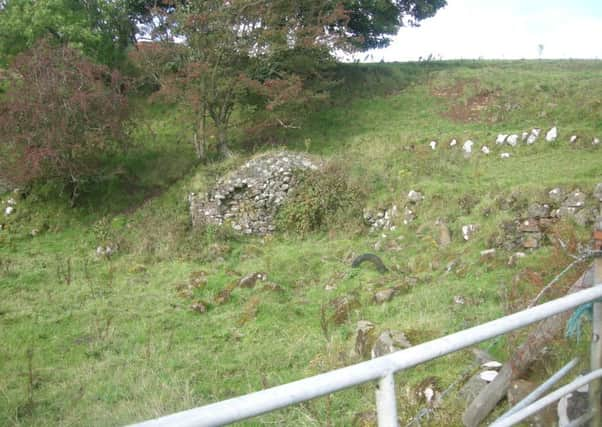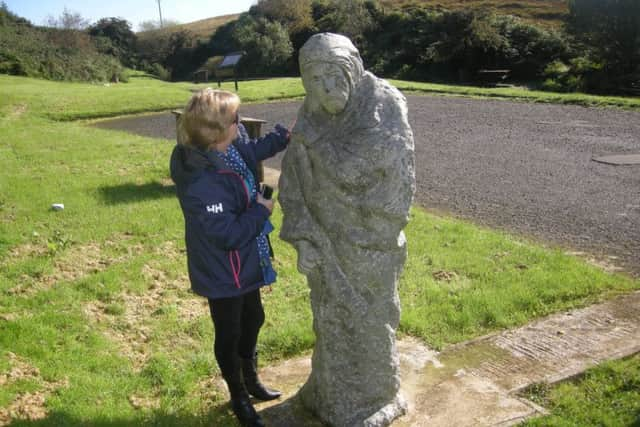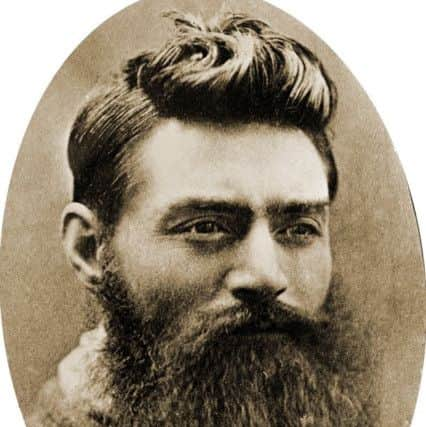Ruthless highwayman's statue stands near to where he buried his victims


It was about a highwayman.
“Your money or your life!” growled the masked outlaw to a solitary traveller, menacingly cocking his pistol.
“I’d better give you my life,” stuttered the beleaguered traveller, “because I’m saving up for Christmas!”


Advertisement
Hide AdAdvertisement
Hide AdHighwaymen, like pirates, featured in every little boy’s imagination back then, nurtured by tales passed around about helpless sailors walking the plank and stage coaches plundered by gangsters.
But it all came from story-books and comics and generally happened in faraway places.
It wasn’t until later years when I heard the song Brennan on the Moor – about William Willy Brennan, hanged in Cork in the early 1800s – that I began to appreciate Irish highwaymen.
The Newry highwayman’s song introduced me to another local outlaw, and I’ve visited Gallows Hill in Omagh, where it’s said that the last man to be hanged was highwayman Tom Eccles towards the end of the 1700s.


Advertisement
Hide AdAdvertisement
Hide AdI don’t know if you know the story of Cushy Glen, Ballycastle-born Mitchell Smyth’s letter began “he was a highwayman who’s a bit of a legend in Co Londonderry”.
I didn’t know the story, thus recounted by Mitchell:
England has Dick Turpin.
America has Jesse James and Black Bart Boles (both of Irish extraction, by the way). Australia has Ned Kelly (also of Irish ancestry) and all have had movies made about them and countless books have been published.


But Ulster has its own highwayman.
Nobody knew of him away from his ‘killing grounds’ of north Londonderry, but now he is firmly on the tourist map because there’s a statue to him at the place where he carried out his nefarious deeds at the tail-end of the 18th century.
His name was Cushy Glen (also known as Pat or Paddy Cushaglen), and the highway he operated on – the coach road between Coleraine and Limavady (then called Newtownlimavady) – was for nearly two centuries known as the Murder Hole Road because of his bloodletting there.
Advertisement
Hide AdAdvertisement
Hide AdThe name was changed to the more respectable Windyhill Road in the 1970s, but the people of Coleraine and Limavady, and points in between, still refer to it by its old name.


It is no longer the main road between the two market towns.
Cushy Glen was no romantic brigand; he was a cold-blooded murderer.
His statue was placed in 2013, beside the road at Largantea and just up the hill from the infamous murder hole, a hollow beside the road where, legend has it, Cushy Glen buried his victims. How many, no one knows.
Advertisement
Hide AdAdvertisement
Hide AdNearby, a crumbling wall is all that is left of the Ram’s Head Coaching Inn, whose owners were reportedly in cahoots with Cushy and his cut-throat wife, Kitty.
The sculpture, by Maurice Harron (who sculpted the iconic ‘Hands Across the Divide’ bronze figures in Londonderry) shows Cushy in a long cloak, clutching a dagger and lying in wait for unwary travellers.
It wasn’t a dagger he was holding one night in 1799 as he waited on the lonely mountain road for cattle-farmer Harry Hopkins, from Bolea, farther along the road – in his hands that evening were two flintlock pistols.
As the story goes, Cushy had been in a tavern in Bridge Street, Coleraine – some say it was the present Queen’s Arms – when Hopkins came in after selling some cattle in the market at Newmarket Street.
Advertisement
Hide AdAdvertisement
Hide AdCushy saw that Hopkins had the proceeds of the sale, in coins in a bag.
“Stay the night,” the bartender begged Hopkins, knowing it was risky to ride alone in the dark carrying so much money.
When he refused the offer the tavern keeper lent him a pistol and Hopkins set off on his horse.
He was nearly home when Cushy Glen leapt in front of him and levelled his pistol.
“Throw down your money bag,” he shouted.
Advertisement
Hide AdAdvertisement
Hide AdHopkins leaned under his horse’s neck as if to throw the bag but instead he fired the pistol, which was already cocked. Cushy Glen took the ball in the chest.
The shot spooked Hopkins’ horse and he galloped home.
And what of Cushy Glen?
It is said that the Reverend William Knox from nearby Articlave, who appears to have also been a physician, was called on and taken, blindfolded, to a house where he treated the robber, but couldn’t save him.
Harry Hopkins (some reports give his first name as James; the marker at the statue says Harry) was 39 when he put an end to Cushy Glen’s reign of terror.
Hopkins lived another 54 years, dying in 1853, having told his story many times.
Cushy wasn’t the only criminal in the Glen family.
Advertisement
Hide AdAdvertisement
Hide AdOral tradition says his brother James was hanged in Derry for rustling cattle.
And what about Kitty?
A web post by one Margaret Leug, who researched the Cushy Glen story in 2005, quotes this entry from a list of marriages published in the Belfast Newsletter of 11th December 1807:
“Mrs Cushie Glen, widow of the late Mr Patrick Cushie Glen of the Murder-hole, to Mr William Lecky, nailer, Newtownlimavady.”
The Cushy Glen statue and an information panel telling some of his story stand in a picturesque picnic site in the townland of Largantea, about 10 kilometres from Coleraine on the south side of Windyhill Road (Route B201).